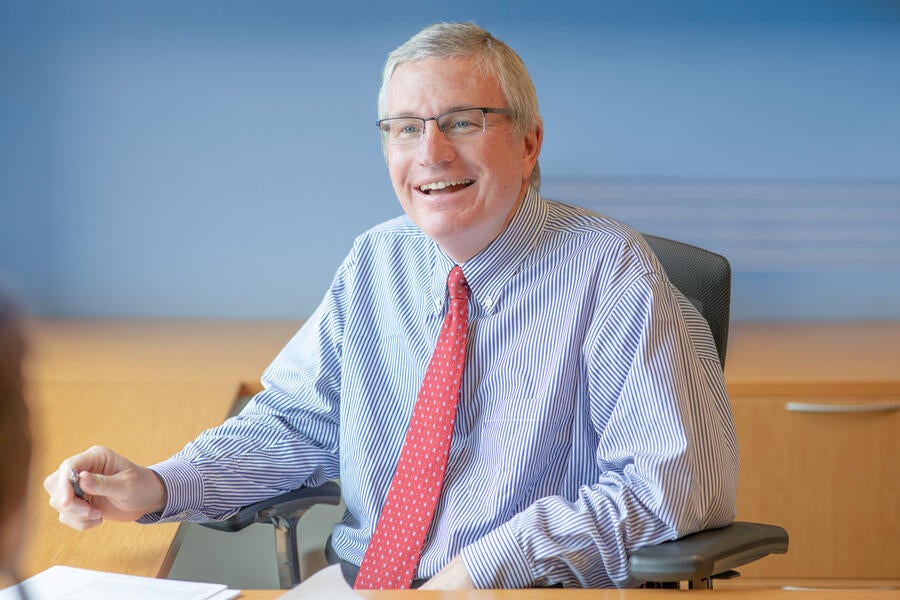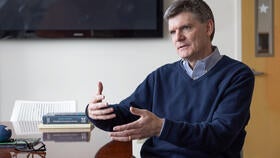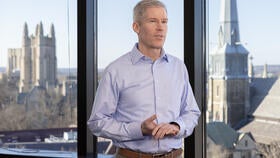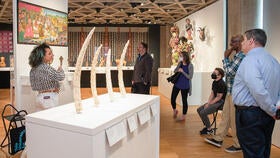
Last summer, Yale University Operations launched a collaborative set of multi-year strategic initiatives in support of the university’s mission. YourYale sat down with Jack Callahan, Jr., senior vice president for operations, to hear more about the operations strategy and these initiatives. This interview has been lightly edited and condensed.
As you think about the future of Yale and the work of crafting a multi-year operations strategy, how would you describe the framework and its pillars?
We’re all here to support the university’s mission, and that’s where the leadership team and I started. We wanted to design a strategic framework where, if you’re in Human Resources, or Facilities, or in administration in an academic unit, you could look at the strategy and think, “This makes sense. This relates to the work I do.”
The three pillars of our Operations Strategy are: Resource the Mission; Build an Effective Operating Model; and Be a Workplace of Choice. We spent a lot of time choosing the right words for the first pillar. Once we landed on “Resource the Mission,” it clicked. “Resource” can serve many purposes. What we do in Finance is to find the money and put it in the right buckets — resource allocation. And it’s also finding the right people, which is what HR does.
The second pillar — build a more effective operating model — is easy to relate to. We're a complex place, like a small town. We turn the lights on every day to operate, so the aim is to make this place easier and more efficient to operate.
Becoming a workplace of choice, the third pillar, while a bit aspirational, is where we would like to go — recruit great people and develop them so they can have long careers here.
There are five values connected to the strategy: Action Orientation; Curiosity; Commitment; Integrity; and Teamwork and Trust. Can you briefly describe those values?
We talked a lot about these. Action Orientation is about not being afraid to make mistakes. That leads to inaction, and we want people to move forward — try things out, fix as you go, and move in the right direction. We want people to know we have their backs.
We have an enormously committed staff, and curiosity is about broadening the scope and having a university-wide view. Our work is complex, no matter what unit you’re in, and curiosity helps you consider the down-stream impact of that work. Integrity is vital in everything we do, and teamwork and trust are linked. We can’t get to teamwork if we don’t trust each other.
What were the catalysts for the new strategy, and how did you begin the process?
It was important that leadership get together to understand what we’re all working on and in what ways we can work together. Acknowledging that you can’t act until you have a group of leaders in the room that wants to work together has been key. On a personal level, it’s exciting to have a team that wants to do something different.
One catalyst for the strategy was to break down some of the silos that exist. The David Geffen School of Drama does not necessarily have a lot to do with the School of Medicine in the academic world, but that’s not true on the staff side. Having separate finance, HR, and IT strategies for staff departments is not the best way to run an institution like ours.
Another catalyst is the growth of the university. I’ve been here almost seven years, and in just that time alone, Yale has grown in leaps and bounds financially and otherwise. But in many instances, the way in which we operate still resembles a much smaller institution. If we don’t fix it now, when are we going to do it? And if we think it’s challenging now, it will only get more challenging in the future.
Can you talk about the initiatives put in place to support the strategy?
We are supporting the Operations Strategy with three initiatives: OneFinance, the Learning Strategic Initiative, and the Recruiting Strategic Initiative.
Over time, the initiatives will have an impact on most staff. Take OneFinance: there are about 1,000 people who do finance-related activities at the university, most of whom are decentralized, so OneFinance will eventually affect processes and the way in which staff do their work.
In terms of the impact of learning and recruiting, learning is an investment in the professional development of our staff. Our hope is that it leads to not only helping staff do their jobs better, but allowing staff to grow in their careers and ensure Yale is a place they want to stay.
Recruiting is about the strength of your team. We want to make recruiting and hiring faster and simpler, with the hope that this will lead to highly talented and diverse hiring pools. And even if you’re not the hiring manager, when the right person is found for your team, you’re going to be a lot happier in your work.
We are focused on these three strategic initiatives for FY2024. Looking ahead, we anticipate they will transition to a continuous improvement mode at the appropriate point and new strategic initiatives will be considered.
What would you like staff members to know about the strategy and the efforts underway?
Leadership knows that the staff at Yale are hard-working and committed. One of the most important things I’d like staff to know is that we are committed to helping them. This is a university-wide initiative — it’s not specific to the people leading OneFinance, Learning, or Recruiting. It is a project to bring our processes to the next level, and to do this, we must work together.
I’d also ask staff to stay open to change. One thing that I’ve heard many times — but a lot less lately — is that “Yale is different,” or “It’s the Yale way.” I hope people can be open-minded about change and improvements to our practices. I encourage colleagues to have a positive-intent point-of-view that everyone is trying to do the right thing. Let’s work together to figure it out, and then I hope staff will be willing to give us their feedback.
But more importantly, I want staff to feel like they are part of the growth, and that now is the time to build a stronger foundation for the university. I hope this gives staff a sense that they are contributing to Yale’s future.
How does all of this fulfill you in your professional life?
Yale College opened doors for me and gave me a very different view into the world. I was a first-generation college student whose grandparents emigrated from Ireland, and I feel a great debt of gratitude. The Yale I experienced was a very small subset of what Yale is today. My whole view was Yale College and Davenport College. I have a much deeper appreciation for what an amazing, amazing place this is. To have the opportunity to be in a leadership position here – to try to have some positive impact on this place – has been a real high for me.
My professional work has often been about aligning organizations to work the best way, and here I am doing that again. It is another hard challenge, not unlike transitioning The McGraw-Hill Companies to Standard & Poors Global, which I did before coming to Yale. That was extremely hard, and this work has been hard in a different way, but I find the challenging work rewarding, and even more so now because we’re starting to pick up momentum and get things done.
Key Goals and Initiatives; How the Operations team's work supports Yale's mission. Video by Robert DeSanto.






